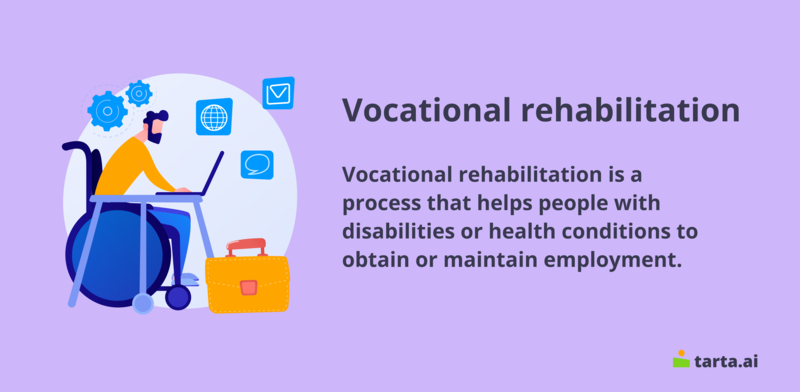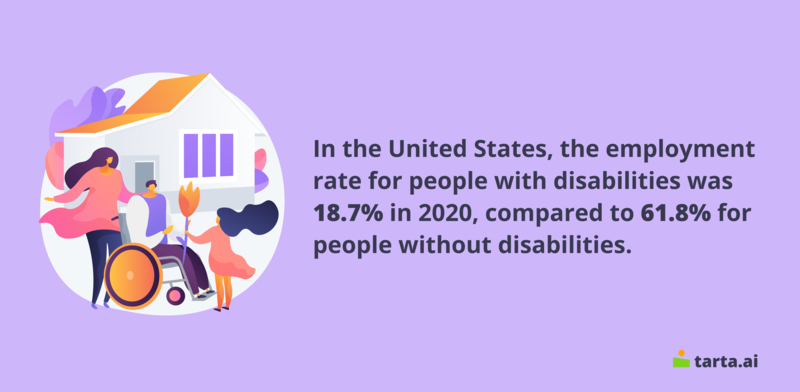The Importance of Vocational Rehabilitation for Individuals with Disabilities

Interesting fact: In the United States, the Vocational Rehabilitation (VR) program is the largest and oldest federally funded program providing employment services for people with disabilities. It has been in operation for over 100 years.
The goal of vocational rehabilitation is to assist individuals in achieving their career goals and maximize their independence and quality of life. This process involves working with a vocational rehabilitation counselor who helps the individual identify their strengths and limitations and develop a plan to reach their career objectives.
The vocational rehabilitation process typically includes an assessment of the individual's skills, interests, and abilities, as well as an evaluation of the job market and employment opportunities in their area. Based on this assessment, the vocational rehabilitation counselor may provide career counseling, job training, job placement assistance, and other services that support the individual's ability to find and maintain employment.
In addition to providing individualized services, vocational rehabilitation programs may also work with employers to identify job opportunities for individuals with disabilities or health conditions. This can involve providing accommodations or modifications to the workplace to ensure that individuals with disabilities can perform their job duties effectively.
Eligibility
Eligibility Criteria | Description |
Disability | The individual must have a physical, mental, or emotional disability that makes it difficult to obtain or maintain employment. |
Vocational Goal | The individual must have a realistic vocational goal, which means a job or career that is consistent with their abilities, interests, and labor market trends. |
Benefit | The vocational rehabilitation services must be likely to result in an employment outcome that will benefit the individual in terms of independence, self-sufficiency, and quality of life. |
Availability | The individual must be available and willing to participate in the vocational rehabilitation program, which may include assessments, training, job search, and other activities. |
Age | In some cases, there may be age restrictions on eligibility for vocational rehabilitation services. |
Citizenship or Residency | In most cases, individuals must be citizens or legal residents of the country or state where they are seeking vocational rehabilitation services. |
It's important to note that eligibility for vocational rehabilitation services is not based on income or financial need. In fact, vocational rehabilitation services are typically provided at no cost to eligible individuals. If you think you may be eligible for vocational rehabilitation services, you can contact your local vocational rehabilitation agency for more information on eligibility requirements and the application process.

Interesting fact: The World Health Organization (WHO) has identified vocational rehabilitation as an essential health service. In their Global Disability Action Plan, they call on governments to provide vocational rehabilitation services to people with disabilities.
Services
The specific services offered may vary depending on the individual's needs and the resources available in their area, but typically include:
- Vocational counseling: A vocational counselor works with the individual to assess their skills, interests, and abilities, and helps them to identify potential career paths.
- Skills training: This may include job-specific training or more general skills development, such as computer skills, communication skills, or time management.
- Job placement assistance: Vocational rehabilitation agencies often have relationships with local employers and can help individuals find job openings that match their skills and interests.
- Assistive technology: This may include specialized equipment or software that can help individuals with disabilities perform job tasks more effectively.
- Job coaching: A job coach works with the individual on the job to provide support, guidance, and feedback.
- Transportation assistance: Some vocational rehabilitation programs may offer transportation assistance to help individuals get to and from work.
- Support services: This may include counseling, mentoring, or peer support to help individuals cope with the challenges of returning to work.
Interesting fact: In the United States, the VR program served over 1 million individuals with disabilities in 2020. Of those served, 53% exited the program with employment.
How to apply?
The process for applying for vocational rehabilitation services may vary depending on the country or state, but in general, the following steps should be taken:
- Contact your local vocational rehabilitation agency: Look for the nearest vocational rehabilitation agency in your area and contact them to request information on how to apply for their services. You can find this information online, through government directories, or by asking your healthcare provider.
- Complete an application: Once you have contacted the vocational rehabilitation agency, they will likely ask you to complete an application form. This form will typically ask for information about your disability, employment history, education, and vocational goals.
- Attend an intake interview: After you submit your application, you may be invited to attend an intake interview with a vocational rehabilitation counselor. This interview is an opportunity to discuss your needs and goals in more detail, and to learn more about the vocational rehabilitation services that may be available to you.
- Participate in assessments: Depending on your needs, the vocational rehabilitation agency may ask you to participate in assessments to evaluate your abilities, interests, and aptitudes. These assessments may include tests, interviews, and other evaluations.
- Develop a rehabilitation plan: Based on the information gathered during the intake interview and assessments, the vocational rehabilitation counselor will work with you to develop a rehabilitation plan that outlines the services and supports you will need to achieve your vocational goals.
- Begin services: Once your rehabilitation plan is developed and approved, you can begin receiving vocational rehabilitation services.
Overall, vocational rehabilitation is designed to help individuals with disabilities or health conditions overcome barriers to employment and achieve their career goals. By providing support, training, and resources, vocational rehabilitation programs can help individuals with disabilities achieve greater independence and improve their quality of life.
- Vocational rehabilitation is a process that helps people with disabilities or health conditions to obtain or maintain employment.
- The goal of vocational rehabilitation is to assist individuals in achieving their career goals and maximize their independence and quality of life.
- Eligibility criteria for vocational rehabilitation services include disability, a realistic vocational goal, benefit, availability, age, and citizenship or residency.
- Vocational rehabilitation services may include vocational counseling, skills training, job placement assistance, assistive technology, job coaching, transportation assistance, and support services.
- Vocational rehabilitation is designed to help individuals with disabilities or health conditions overcome barriers to employment and achieve their career goals, leading to greater independence and improved quality of life.
- To apply you must Contact your local vocational rehabilitation agency and complete an application
FAQ
What is vocational rehabilitation?
Vocational rehabilitation is a program that helps people with disabilities or other barriers to employment prepare for, find, and maintain jobs.
Who is eligible for vocational rehabilitation services?
Individuals with disabilities, such as physical or mental impairments, who require vocational rehabilitation services to achieve employment are eligible.
What services does vocational rehabilitation provide?
Career counseling, vocational training, job search assistance, and accommodations in the workplace. Other services may include assistive technology, transportation, and financial support for education or training.
How do I apply for vocational rehabilitation services?
You can contact your state's vocational rehabilitation agency to apply for services. You will likely need to provide documentation of your disability and demonstrate that you require vocational rehabilitation services to achieve employment.
Is vocational rehabilitation only for people with physical disabilities?
No, vocational rehabilitation services are available for individuals with a wide range of disabilities, including physical, mental, and developmental disabilities.
How long does vocational rehabilitation last?
The length of vocational rehabilitation services varies depending on the individual's needs and the services required.